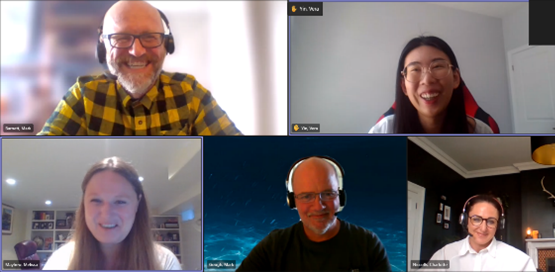On June 24, 2021, scientists from the Nuclear Waste Management Organization (NWMO) and from U.K.-based Radioactive Waste Management (RWM) hosted a virtual learning exchange session on environmental data management. This meeting was the third time the two groups had met, and built on the goal they had established last year to share knowledge and strengthen ties among sister organizations.
“These learning exchange sessions support collaboration and knowledge sharing internationally,” says Melissa Mayhew, Senior Environmental Scientist at the NWMO. “It underscores how both our work and RWM’s on used nuclear fuel storage are driven by scientific consensus and draw on the expertise of an international network of researchers, engineers and scientists.”
The June 24 virtual session was attended by Melissa Mayhew and Vera Yin (Assistant Technical Officer) on behalf of the NWMO; and by Mark Gough (Principal Environmental Assessment Manager), Charlotte Niccolls (Senior Environmental Assessment Manager) and Mark Barnett (Senior Environmental Assessment Manager) for RWM.
RWM started off the session by sharing a presentation on the topic of citizen science: the collection and analysis of data relating to the natural world by ordinary community members, typically as part of a collaborative project with scientists. They spoke about the various applications, its advantages and disadvantages, and how they could use this approach in their work. The NWMO participants shared their own applications and experiences of citizen science in the subsequent discussion.
The NWMO followed up with a presentation on the Environmental Data Management System (EDMS) that is being implemented to support our environmental baseline monitoring program. The EDMS will help the NWMO manage a very large volume of data, coming from different types of users (community members, local partners, consultants, etc.), in a very short amount of time. It will also assure quality control and facilitate sharing the data in a timely manner, which was a key element identified by community members and technical experts alike in the co-design process of the environmental baseline monitoring program. Ms. Yin provided a demonstration of one of the digital forms that will be used to replace the paper field data collection forms for the physical environment and biodiversity baseline studies. After the presentation, the two groups discussed the challenges and opportunities related to the EDMS work.
“The ideas and findings that we share with each other through these learning exchange sessions are really valuable for our work,” says Dr. Gough. “When you’re working on projects that have implications and impacts not only for this generation, but many more into the future, it’s critical that we share our experiences and best practices with each other.”
The next learning exchange will take place later this year.
About RWM
Radioactive Waste Management (RWM) is a wholly owned subsidiary of the Nuclear Decommissioning Authority (NDA), which is an Executive Non-Departmental Public Body of the Department for Business, Energy and Industrial Strategy (BEIS). One of its roles is to bring about a permanent, safe solution to manage the United Kingdom’s higher activity radioactive waste. It is its responsibility to implement geological disposal and provide long-term radioactive waste management solutions, with communities at the heart of what it does.

